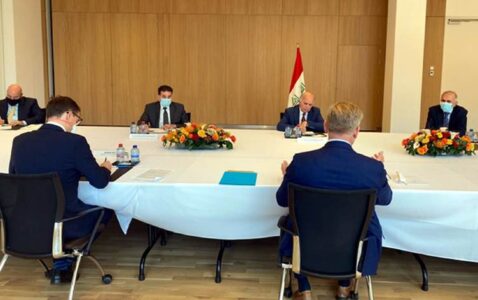
Iraq and NATO to keep coordinating and eliminate Islamic State terrorists
Iraq and NATO aim to continue their “coordination and consultation” to ensure the complete defeat of the Islamic State (ISIS) in Iraq, the country’s foreign ministry has said, following a meeting between top officials from both parties.
Iraqi foreign minister, Fuad Hussein and NATO Assistant Secretary-General John Menza met in Brussels on Thursday to discuss NATO’s training and advisory role for the Iraqi security forces, according to a foreign ministry statement.
“The two sides exchanged views on the role and tasks of NATO forces in Iraq, and prospects for cooperation in the areas of training Iraqi military forces, and providing advice to the security authorities in order to enable Iraq to eliminate Daesh terrorist remnants,” read the statement, which used the Arabic acronym for ISIS.
Both sides “stressed the importance of continuing consultations and coordination between specialists from both sides,” the organisation’s statement added.
Hussein landed in Brussels on Wednesday, when he met with NATO Secretary-General Jens Stoltenberg at NATO headquarters. The two parties were looking to complete an agreement to extend the presence of NATO in Iraq.
Stoltenberg showed NATO’s readiness to provide “aid according to the needs of the Iraqi side,” read a statement from the Iraqi foreign ministry released on Wednesday. NATO said in post-meeting statement that it would continue “to work closely together in the fight against terrorism.”
“NATO is now considering how to step up the alliance’s efforts in Iraq, in full coordination with the Iraqi government,” the statement added.
NATO’s training mission in Iraq began in October 2018, and is currently led by Canada. Last November, Denmark offered to take charge of the mission for an 18-month period, beginning in December 2020.
ISIS was declared territorially defeated in Iraq in December 2017. However, remnants of the group continue to wage a low level insurgency, conducting ambushes, kidnappings, and targeted killings.
NATO’s training mission, which sought to support the country’s armed forces to better fight ISIS, involved around 500 troops.
After the US assassination of Qasem Soleimani in Baghdad on January 3 of this year, Iraq’s parliament passed a non-binding resolution demanding the expulsion of all foreign forces, and the NATO operation was placed on hold.
Iraq decided later in January to review its security relationship with the US-led Coalition – a multinational alliance supporting Iraqi and Peshmerga forces with training, equipment, and air cover since 2014 – by attempting to reach a new security agreement with NATO. In the new deal, foreign troops would remain in Iraq under NATO control. Their role would be limited to training and advising Iraqi forces in the fight against ISIS, and they would no longer be permitted to carry out ground operations against the terrorist group.
NATO said in February that troops from the US-led Global Coalition to Defeat Daesh (ISIS) were being shifted to NATO’s own mission.
Source: Rudaw





